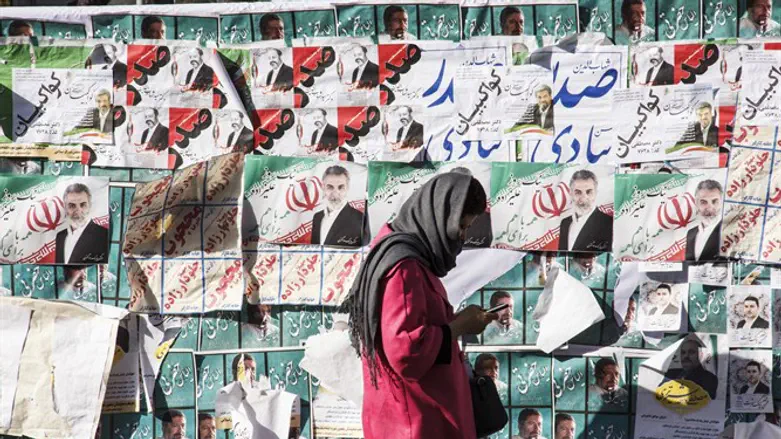
At certain stages of its political development, the mullahs’ regime has allowed latitude in what is called the equation between moderation and hard line. Sometimes there is an Ahmadinejad and other times a Khatami. It’s been that way since Supreme Leader Ali Khamenei took office.
The early days were consensus-building, namely that Khamenei secured the leader’s seat to succeed Khomeini, while Hashemi Rafsanjani sat in the president’s chair from 1993 to 2001. This equation was the main guarantor of the passage of the most critical phase in the history of the mullahs’ regime at that time.
Most of the stages in the development of the mullahs’ regime in the previous decades saw a division of positions and roles between the so-called reformist and hardline currents. It was not only the presidency, but the power sharing of all the institutions of the regime, such as the Shura Council (parliament), the most important in the role play.
Of course, the current of moderation has to be tightened whenever it comes to more elitist and influential institutions within the system, such as the Guardian Council, the Expediency Council and the judiciary.
What is happening now is that for the first time, the Iranian regime is devoid of so-called moderates or reformists.
The official political arena of Iran has completely abandoned them. All institutions are in the hands of the hardliners and the competition between the hardliners and those even more so.
What is the impact on Iranian behavior and foreign policy?
Does this scene produce a totally different Iran than before? Is it true that the worst in Iranian behavior and approach is yet to come? The answer to this question is not in the hands of the mullahs’ regime. It depends on the regional and international environment.
In other words, the Iranian hardline landscape has been meticulously designed to deal with the most delicate circumstances in the regime’s history. The regime wants and needs strategic returns to ensure that it stays in place.
There are important details that need to be carefully analyzed. The first is the mullahs’ relationship with the International Atomic Energy Agency (IAEA). This relationship, currently going through an unprecedented phase, shows that the mullahs are playing their last cards to break the deadlock of the harsh US sanctions.
The mullahs have long been keen to keep their relationship with the international agency separate from the strained relationship with the US.
The IAEA is the main “witness” that the global collective can call upon to find out the truth about what is going on between Tehran and Washington, as well as the validity of the suspicions and accusations made by international intelligence and political circles against the weapon-seeking regime.
Thus, risking the mullahs playing the IAEA card and testing their relationship with it means resorting to a suicidal option. But this option is not necessarily about escalating to confrontation. Rather, it is about pushing the mullahs’ brinkmanship with the new US administration to the hilt.
The mullahs realize they have new strategic rules. The IAEA is suspicious of unearthed secrets in Iran’s nuclear program. Reports of large amounts of 60% enriched uranium may be reported to strengthen their negotiating position. Some even believe that the hard line approach to the relationship with the IAEA was intended to encourage it to issue warnings about an impending nuclear Iran.
As was the case when IAEA Director General Rafael Grossi spoke and famously warned recently about the “genie” that will come out of the “lamp,” which some and I see as pleasing the mullahs, the impact on US negotiators is far greater than the impact of the threats from the mullahs’ leaders.
That was the case when Secretary of State Tony Blinken suggested that Iran could be weeks away from having nuclear weapons materials if it keeps violating the nuclear deal.
So Iran’s Supreme Leader has decided to take one last step in brinkmanship, to go all in to win major US concessions in order to lift the tough sanctions. This maneuver requires changing the face of the regime and wearing a tougher mask.
It even chose to promote a president on the US sanctions list who is a revolutionary hardliner. All this means that leaving things as they are will push the mullahs to adopt new radical measures regionally and internationally.
The West is well aware of the impact of the absence of any “moderate” profile to talk to in the Iranian political arena. No one knows who will succeed Mohammad Javad Zarif as head of Iranian diplomacy. It is also unclear whether Iran’s most prominent negotiator in Vienna, Abbas Araghchi, will complete his role or go back home with his superiors.
All of these elements are putting pressure on the Vienna negotiations. They are putting pressure to get Iran the concessions it is demanding quickly. President Joe Biden wants to speed up the resolution of the Iran nuclear deal and focus on China’s defiance of US influence. In addition, there are signs of growing tension in Russia’s relations with the West.
Dr. Salem AlKetbi is a UAE political analyst and former Federal National Council candidate


